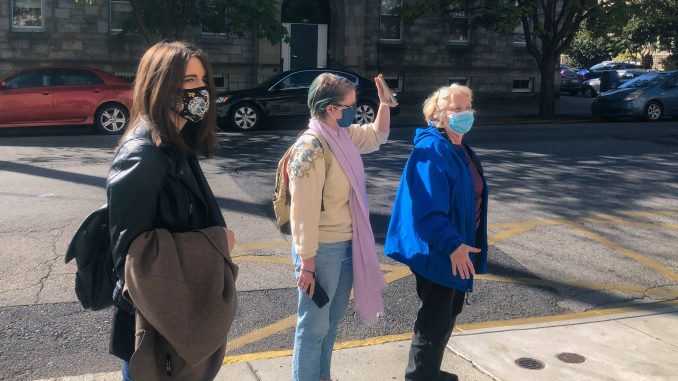
Emily Neumeier became fascinated with the concept of monuments in the summer of 2020 as she watched people around her question the significance of multiple statues and landmarks as they participated in social justice movements following the murder of George Floyd.
“It was a big summer for monuments, and it was directly tied to these questions about what monuments represent us,” said Neumeier, an art history and Islamic art professor. “There were conversations about the Robert E. Lee statue, there were conversations about confederate monuments, about monuments in Philadelphia.”
This winter, Neumeier is leading her graduate student seminar in creating “Monument Biography,” a 10-part podcast discussing the different meanings and significance that historical sites can embody. The show launched in November 2021 and just released its eighth episode on Feb. 3, which covered the Masonic Temple of Philadelphia.
“The idea is that each episode, each student, each producer, selected a monument that was special for them, that was meaningful to them, and they produce an entire episode trying to tell the biography, the story of each of these places or sites,” Neumeier said.
The podcast publishes two to three episodes per month on STELLA Radio, which is part of the online exhibition platform the Tyler School of Art and Architecture created in 2020 to virtually showcase students’ work during the COVID-19 pandemic.
“Monument Biography” isn’t Neumeier’s first podcast experience, but it’s her first time storyboarding and audio editing with others, she said. Still, she was excited to teach students about the technical side of podcasting, conducting interviews and doing field work.
Kati Gegenheimer, who helped organize STELLA’s launch in 2020, was excited to help Neumeier tackle this project and is very proud of how well the students’ episodes turned out.
“They all really put forth a lot of effort and time to make these really professional podcast episodes as a group,” said Gegenheimer, Tyler’s associate director of academic enrichment programs. “That is no small task.”
Michael Lally, a doctoral candidate in the art history program, hosted the podcast’s fifth episode, which was released on Jan. 13. He took listeners on a narrative exploration of the Fairfield Hills Psychiatric Hospital, which is located in his hometown Newtown, Connecticut.
Even though he saw the site while growing up, Lally didn’t know it previously was a psychiatric hospital. He visited last year and became interested in the hospital’s connection to Newtown, and found stories about the doctors and patients who gathered to watch townspeople play baseball on the property’s fields.
“When I visited recently, it was interesting that there was no acknowledgement of the site being a former psychiatric hospital out on a sign or anything,” Lally said
Lally had never created or listened to a podcast before, but enjoyed the process of producing his episode, even though there was a learning curve. He felt like the hard work was worth it after seeing how much friends, family and peers enjoyed his podcast.
Other episodes include “Love to Hate It, Hate to Love it – Philadelphia’s First Skyscraper,” which dives into the shaping of the Philadelphia skyline, and “Stories of the Galata Tower,” which unpacks the many reinventions of the tower in Istanbul.
Mayret Rubenstein, a 2020 art history alumna, enjoys listening to the podcast because it makes her feel connected to Temple’s art history community.
“You’re never sure what you’re going to learn until you listen to the episode,” Rubenstein said.
“Everything is different and understanding that those are your classmates, it feels very joyful.”
Rubenstein was recently accepted into Temple’s art history masters program, and hopes she can work on the podcast as a graduate student.
Neumeier hopes the podcast will encourage other students or faculty at Temple to produce podcasts of their own and open up a new perspective to listeners.
“One thing I hope that the listeners get from this particular podcast is realizing just how fluid the meaning of monuments are,” Neumeier said.



Be the first to comment